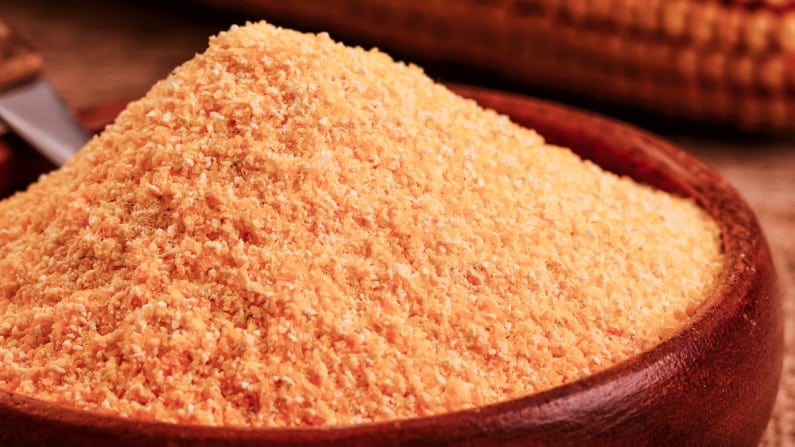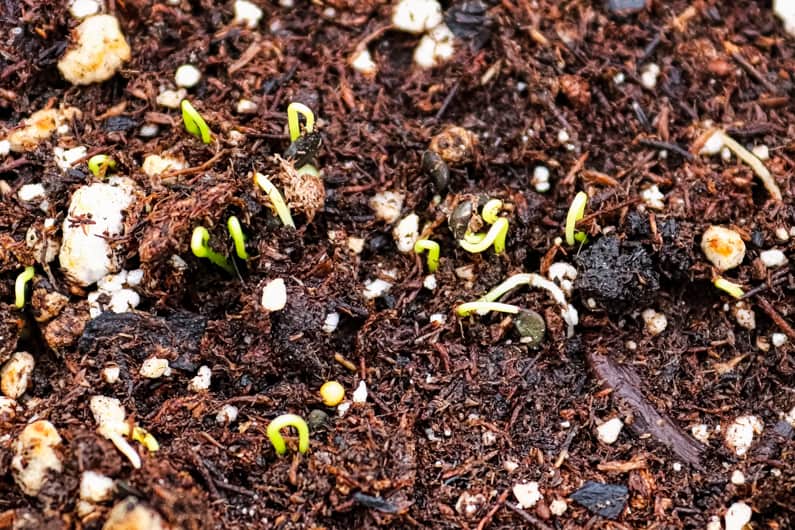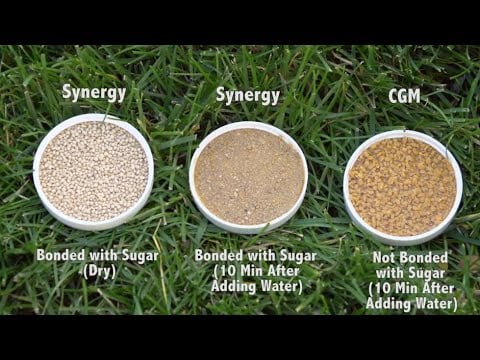Corn Gluten Meal for Weeds: Is it an Effective Weed Killer?
INSIDE: Frustrated with weeds and looking for a safe weed killer? Discover the surprising truth about using corn gluten meal for weeds. Keep reading to get the facts now!
Looking for natural or organic ways to control pesky weeds in your garden?
If so, you may be wondering if corn gluten can help.
Companies that sell organic weedkillers market corn gluten meal as a natural and safe pre-emergent herbicide.
Some gardeners swear by it. While others say it doesn’t work at all.
So, what’s the truth? Does corn gluten control weeds?
Keep reading to find out whether it’s effective for controlling weeds in your garden.
What’s inside this article about corn gluten meal for weeds:
Heads up: I’ll earn a small commission if you buy something after clicking a link in this post. I only link to products I’d recommend to my best friend.

Corn gluten meal for gardens: everything you need to know
What is corn gluten meal used for in the garden?
It’s often used as a lawn food and a pre-emergent to control weeds.
That means it’s a weed preventer. It won’t kill existing weeds.
And to be clear, we’re not talking about any old type of corn gluten meal.
And we’re definitely not talking about cornmeal. Cornmeal does nothing to prevent weeds!
To work as a pre-emergent:
- It needs to contain 60 percent protein.
- And it’ll be labeled as an herbicide.
Related: Weeding bucket DIY (full instructions and supply list included)
Are there any benefits of using corn gluten meal in the garden?
Organic herbicide producers say that:
- It’s a natural product.
- It feeds your plants.
- It’s relatively easy to apply.
Sounds good, right?
On the surface, these benefits sound great if you want to avoid using chemical weedkillers.
But they don’t tell the whole story. Not even close.
Corn gluten meal isn’t a silver bullet.
But first, let’s talk about how it works. Because that’s one of its major drawbacks.
How does corn gluten meal kill weeds?
While corn gluten meal is considered a “pre-emergent” herbicide, it doesn’t stop seeds from germinating.

It prevents the weed from forming roots after the seed germinates. Sometimes.
- Corn gluten meal contains proteins that can inhibit the growth of weed seeds.
- When applied to the soil, the proteins in corn gluten can stop the roots of weed seeds from growing properly.
- This makes it difficult for weeds to establish themselves in your garden, as they can’t get the nutrients and water they need to survive. Sometimes.
But the developing roots need to absorb enough protein from the corn gluten meal to halt their growth.
- That’s why you need to apply quite a bit of it for it to work.
- The recommended application rate is 20 pounds per 1,000 square feet!
- That’s far more than any “chemical” weedkiller.
Corn gluten is useful only as a pre-emergent herbicide; it doesn’t control existing weeds. If weed seeds have already germinated and taken root, a late application of corn gluten will only fertilize the weeds.
And you need to have a window of good weather when applying it.
- Corn gluten meal must be applied in early spring before weed seeds germinate.
- If you apply it too late, it won’t prevent weed growth. Instead, it’ll fertilize the weeds you already have.
- And the roots of the newly sprouted weed seeds need to be relatively dry as they try to develop.
- Iowa State researchers found that “affected plants may recover and resume rooting” if the soil is moist enough. So, a short dry period is critical between germination and root growth.
Related: How to identify weeds by photo for free.
How long does corn gluten prevent weeds?
How long it works can vary. It depends on several factors, including the climate, soil conditions, and the type of weeds you have in your garden.
Generally, corn gluten meal can prevent weed growth for up to 5-6 weeks after you apply it.
But it won’t last that long if you have heavy rainfall or the soil is disturbed. Both can break down the corn gluten and reduce its effectiveness.
There are other drawbacks to using corn gluten meal for weed control, but they’re generally overlooked by gardeners who want an all-natural weedkiller.
So, let’s talk about those drawbacks. We’ll start by answering the million-dollar question…
Does corn gluten work for weed control?
As we’ve already discovered, corn gluten doesn’t control existing weeds but can prevent them in certain situations.
And what you really want to know is, “Does it do a good job of preventing weeds?”
The short answer is that it can prevent some weeds for some gardeners.
But there are important reasons why it’s not the best choice for natural weed control.
Here are the disadvantages of using corn-based weed preventers.
1. Success with corn gluten meal depends very much on the weather at the time of application.
A short dry period is critical between seed germination and root growth for corn gluten meal to work as a weed suppressor.
So, if the weather gods smiling down on you, it can work.
2. Corn gluten meal isn’t effective on all types of weeds or in all areas of the U.S.
Corn gluten meal can control about twenty different weed seeds including crabgrass, foxtails, dandelion, lambsquarter, pigweed, and purslane.
But it doesn’t work in all parts of the U.S.
- Turf grass specialist Tom Cook from Oregon State University wasn’t able to duplicate the results reported by Iowa State researchers.
- Even the researcher from Iowa State University who holds the patent on corn gluten meal is cautious in his recommendations for using it to control weeds.
- Trials have shown it to work in commercial greenhouses. But then not work when trialed outside in the same location.
- While it’s relatively easy to control the factors that affect seed germination (temperature and moisture) in a greenhouse, those are factors you can’t control in your garden.
What isn’t always clear from the product labels is that corn gluten doesn’t just affect weed seed growth when properly applied.
It’s also a fertilizer.
And that might sound like a plus, but it isn’t. Here’s why…
3. Corn gluten meal is about ten percent nitrogen by weight.
And you need to use quite a bit of it to prevent weeds!
This means in some areas, the application rates needed to adequately prevent weed growth exceed the legal limits for fertilizer applications.
Yes, some states have set limits on how much nitrogen can be added to an area at one time – because of nitrate runoff. Excess nitrates in waterways negatively affect aquatic life.
And to top it off, this much nitrogen is also probably more than you should be adding to your garden or lawn at any one time!
This kind of overapplication of nitrogen can be very stressful on lawns over the long term.

4. In some situations, it can make your weed problem worse.
Before you apply it, you’ll need to kill any existing weeds first.
Remember, it’s a pre-emergent, so it doesn’t negatively affect weeds that have already started growing.
In fact, it tends to produce a flush of growth in weedy and non-weedy plants because of its high nitrogen content.
So, if you don’t get rid of the existing weeds before using it, you can end up with a bigger weed problem!
5. You need to apply a lot of it and apply it at least two times per year.
The application rate is 20 pounds per 1,000 square feet.
- This is a much higher application rate than other lawn fertilizers and pre-emergents!
- Most broadcast spreaders aren’t designed to apply corn gluten meal and can’t apply it at a 20 pounds per 1,000 square feet rate.
- So, multiple passes may be necessary for most spreaders.
And since it only lasts 4-6 weeks, it’s not a one-time solution.
You’ll need to apply it twice a year—once in the early spring and again in late summer or early fall—and be lucky with the weather each time.
Applying it twice a year ensures the corn gluten meal is in the soil when weed seeds are germinating, which is the only time it’s effective.
Watch Organo-Lawn explain why corn gluten meal doesn’t always work on lawn weeds
6. It’s pretty expensive.
Since you must apply a lot of corn gluten meal and apply it several times per season, it’s expensive.
With a price of about $2-5 per pound (not including shipping), it would cost $120-$300 to apply it one time to 3,000 square feet at the recommended rate of at least 20 pounds per 1,000 square feet.
Since you need to apply it several times per season, the costs rack up fast!
There are far cheaper ways to control weeds.
So, I can’t recommend using corn gluten meal to prevent weeds.
But what if you really want to try it?
Contact your local extension office to see if they recommend it for your area.
Corn gluten meal for lawns
If you have turf and want to use it, here’s how much corn gluten to apply to your lawn
First, choose the right product.
Only use products that are 60 percent protein and labeled as an herbicide.
Examples include:
- Preen Natural Weed Control
- Espoma Organic Weed Preventer
How much is needed?
You must apply at least 20 pounds of corn gluten meal per 1,000 square feet.
To figure out how much corn gluten meal to apply to your lawn, you’ll need to know the square footage of your lawn.
How to apply corn gluten meal to your lawn
Once you have the square footage, use the following formula to determine how much corn gluten meal to apply:
- Divide the square footage of your lawn by 1,000.
- Multiply the result by 20.
- The final number is the amount of corn gluten meal, in pounds, that you should apply to your lawn.
For example, if your lawn is 2,500 square feet, you would divide 2,500 by 1,000 (2.5), then multiply that by 20 (50). This means you should apply 50 pounds of corn gluten meal to your lawn.
Please keep in mind that many broadcast spreaders aren’t designed to apply corn gluten meal.
And few can apply it at the required 20 pounds per 1,000 square feet rate.
So, multiple passes may be necessary.
When to apply corn gluten to lawns
Apply it when dry weather is expected and the soil temperature is warm enough to promote weed seed germination.
The best time to apply corn gluten meal to your lawn is in the spring, before annual weed seeds have a chance to germinate.
The second best time to apply it is in late summer or early fall to help control “winter annual” weeds.
But don’t use corn gluten meal on newly seeded or overseeded lawns. It can prevent grass seeds from taking root.
Corn gluten meal vs cornmeal
What is cornmeal?
Cornmeal is a type of flour made from ground corn.
It’s commonly used in cooking and baking.
Is corn gluten meal the same as cornmeal?
No.
Corn gluten meal is a byproduct of corn processing that contains high levels of protein and is often used as a natural fertilizer.
It is not the same as cornmeal, which is ground corn.
But some people believe cornmeal can be used to control weeds and fungi in lawns and gardens.
News flash: they’re wrong!
And cornmeal can attract pests and rodents.
Plus, it can actually promote the growth of fungi. Cornmeal agar is commonly used in labs as a growth medium for fungal cultures.
The bottom line? Cornmeal is useless in lawn care and gardening.
If you need a reliable solution for weed control or fungal diseases, you’ll need to consider other options available at your local garden center.
Does corn gluten meal prevent weeds?
It can prevent some weeds from sprouting. But there are some caveats. You must purchase corn gluten meal that has a 60% protein content and is labeled as an herbicide. And its application is tricky. You need a stretch of dry weather for it to work.
How long does corn gluten prevent weeds?
Corn gluten meal typically prevents weeds for about 6-8 weeks. For corn gluten to prevent weeds, you have to apply it before weed seeds sprout. Otherwise, you’ll only be fertilizing your weeds.
Can you put too much corn gluten on your lawn?
Yes, you can put too much corn gluten on your lawn! Corn gluten meal is about 10% nitrogen by weight. It’s not a slow-release fertilizer. And applying too much nitrogen to your lawn at one time will weaken it over the long term. More is NOT better. Here’s how to calculate the correct amount to use on your lawn.
Does corn gluten have nitrogen?
Yes, corn gluten contains nitrogen. It’s around ten percent nitrogen by weight. And its NPK is typically listed as 9-0-0.
Does cornmeal kill weeds?
No! Cornmeal doesn’t kill weeds. But corn gluten meal that contains 60% protein and is labeled as an herbicide can prevent weeds. Cornmeal will have no effect on any weeds.
The bottom line: Should you use corn gluten meal on your weeds?
While corn gluten meal may seem appealing for organic weed control, it’s not the most effective method.
Here are the reasons I don’t recommend it:
- The application is tricky.
- It’s not likely to work in areas that get a lot of rain in the spring.
- It’s likely to overload your garden with nitrogen.
- It’s expensive.
When compared to chemical weed killers, corn gluten meal is less effective at controlling weeds.
Chemical herbicides can target both pre-emergent and post-emergent weeds, and they can be more potent than natural alternatives.
Other environmentally friendly weed-control measures, such as drip irrigation to keep the soil surface dry, organic mulches or living mulches are cheaper and more effective than corn gluten meal.


